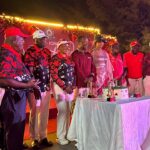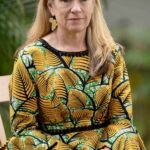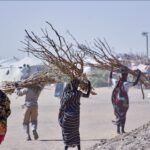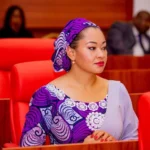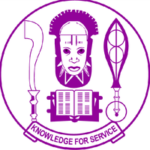Some beneficiaries at the recent Livelihoods and Nutritional Empowerment (LINE) Project Close-out and Lessons’ Dissemination event in Bauchi
A news analysis by Angela Atabo, News Agency of Nigeria (NAN)
Bauchi State, just like most states in northern Nigeria, has had its share of agricultural challenges.
Although farming is one of the mainstays of the state, it is no doubt accompanied with some challenges that sometimes discourage residents from taking to farming.
These challenges according to Ahonsi include inadequate farm inputs, poor agricultural yields, food insecurity, lack of awareness of healthy food diversity for nutritional balance, malnutrition among others.
However, some organisations such as Oxfam have taken the initiative to champion agriculture revolution in the state to complement the state government’s efforts towards boosting agriculture.
Dr Vincent Ahonsi, Country Director of Oxfam Nigeria, at a recent Livelihoods and Nutritional Empowerment (LINE) Project Close-out and Lessons’ Dissemination event affirmed that Bauchi farmers face several challenges in their trade.
The event was organised by Oxfam in collaboration with the Canadian Government in Abuja.
He said with this in mind ,the Canadian Government intervened by sponsoring a 10 million dollars Livelihood and Nutritional Empowerment (LINE) project implemented by Oxfam in six local government areas(LGAs) of Bauchi State.
According to him, the project agreement was signed between the Government of Canada and Oxfam on March 21st 2016, and the implementation was carried out in Bauchi State.
The project which has been running for six years has empowered 16,598 smallholder farmers in six LGAs of Tafawa Balewa, Alkaleri, Ningi, Darazo, Shira and Gamawa with dry season farming inputs including seedlings, fertilizers and herbicides.
“Oxfam is a world-wide development organization that mobilizes the power of the people against poverty.
“In Nigeria, we also work to influence policy change in favor of the poor and most vulnerable, promoting food security, and supporting small scale farmers to improve the livelihoods of men and women in rural areas.
“We focus on meeting vulnerable people’s needs, saving lives, sustaining increased incomes for the poorest and transforming attitudes about women’s roles and rights.
“Today we are gathered here to officially close out the Government of Canada funded, Oxfam-implemented Livelihoods & Nutritional Empowerment (LINE) reviewing the lessons learnt from the project implementation”, he said.
Ahonsi said the project trained farmers on climate-smart agriculture, engaged in financial inclusion, which is setting up village savings and loans, associations and cooperatives.
He said the project provided no fewer than 1400 boreholes as well as no fewer than 700 pumping machines to facilitate dry season farming in Bauchi state.
According to him, the project is a demonstration of a robust cooperation between the governments of Canada and Nigeria, through the Federal Ministry of Finance, Budget and National Planning, the Bauchi State Government and Oxfam.
Ahonsi therefore, said the LINE Project was implemented through local partnerships to purposely build the capacity of local stakeholders and NGOs, train small-scale farmers to improve their capacities and knowledge base; and strengthen other local value chain actors.
Ms Djifa Ahado, Head of Development Cooperation, High Commission of Canada to Nigeria, commended the project for empowering many farmers in rural areas in Bauchi State.
Ahado expressed satisfaction with the performance of the LINE project adding that it ended with very tangible results.
“In retrospect, this project was approved before Canada had launched its feminist international assistance policy. Yet all the project’s interventions were designed with women in mind, and were testing ways to reach gender equality in communities, within local government and at the state levels.
“This type of collaboration is key to the project implementation, but more importantly for the sustainability of results and impacts.
“In all projects we have here in Nigeria, this is the type of collaboration we are looking for in order to support self-reliance and continuously ensure the relevance of our projects for people, communities, local governments and states”, she said.
Mr Saleh Giade, the Permanent Secretary, Bauchi State Ministry of Budget and Planning, said that the LINE Project recorded huge successes in the selected six local government areas.
Giade said that there were plans to extend the lessons learnt from the project to other local governments in the state.
Some beneficiaries of the project expressed gratitude to Canadian government and its implementing partner, Oxfam, for the privilege they enjoyed.
One of the beneficiaries, Ms Fatima Aminu, said before participating in the project she could barely make ends meet.
She said the knowledge and empowerment she received she was able to engage in dry season farming through which she made some money.
She said Oxfam gave them a pumping machine for irrigation and her farm had more yield, unlike during the wet season farming.
“Oxfam gave us economic trees to plant which is another way of fighting desertification, we were given seeds which we have been replicating, and we were also linked to where we can buy fertilizer at a cheaper rate’’, she said.
Ms Hajaratu Pisagih, a partner in the Women Empowerment Initiative Bauchi state, said the project touched the lives of many women in the state.
Pisagih said prior to the project, many women were marginalised, however, the project made it possible for women to participate in decision-making and have farms.
She said this has increased productivity and brought a lot of economic resources to their families.
“We also introduced to a savings scheme where we save money, a woman who has never held N5000 of her own got about N300, 000 after the savings and it has put smiles on their families and the communities”, she said. (NANFeatures)
**If used please credit the writer and News Agency of Nigeria.



